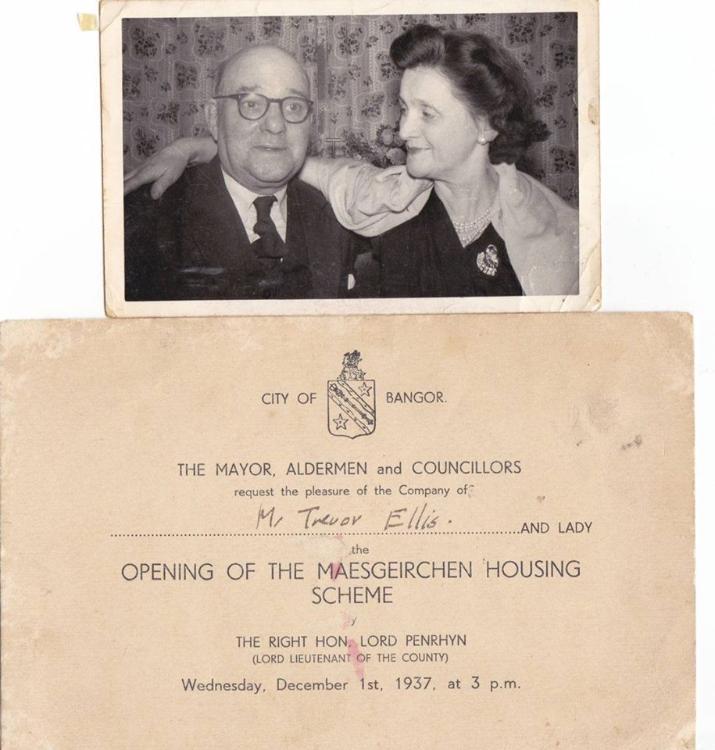Bangor Civic Society | Message Board & Forum
› General
›
City, Buildings, Businesses and Land History
Maesgeirchen
|
|
History of Maesgeirchen
Maesgeirchen is situated on the outskirts of the City of Bangor, Gwynedd, North Wales, UK. It is noted as the 3rd biggest housing estate in North Wales and has in the region of 4000 people living here. There are approx 1000 dwellings on the estate with approx 220 of those being owner/occupier. Maesgeirchen was originally conceived out of an idea to take up the overspill of Bangor before the outbreak of World War 2. It was the council's re-development programme to rehouse families from condemned and overcrowded properties in the town. Ffordd Castell was among the first streets finished in December 1937; shortly after, the first tenants moved in. A total of 304 houses were built on the estate before the outbreak of the 2nd World War with a further 274 houses and flats being built, plus 234 at Tan-y-Bryn after the war. The houses were constructed at an average cost of £390.00 each and tenants were charged a rent of 7s.6p a week. Maesgeirchen did not escape untouched during World War 2. On the evening of Friday October 24th 1941 at 8.38 the drone of enemy aircraft was heard overhead. Minutes later two stray parachute mines landed at each end of Maesgerchen - one at the top of the hill leading to Penrhyn Ave the other on the old road at Lon-y-Felin, near the 15th green of the golf course. Emergency services arrived to find a 26ft crater (diameter) and 10ft deep; one house was completely demolished (No.1 Penrhyn Ave); 29 severely damaged and another 190 slightly damaged. Three people were killed - Jack Lewis, a Post Office engineer and former Bangor City footballer who had rushed outside on hearing a loud noise only to receive the full blast of the bomb; Mrs Ann Roberts who was staying with her daughter at No.1 Penrhyn Ave; and Charles Walters, a BBC chauffeur who was driving up the hill and who, ironically, had been evacuated to Bangor with his employers in order to escape the Bristol bombing. Fourteen injured people were taken to the C & A infirmary, 11 of whom were detained, being in a serious condition. Seventy people were rendered homeless, furniture that could be salvaged was stored in the old Woolworth building at 297 High St, Bangor and schoolrooms at Horeb Chapel, Hirael. Accommodation was found for the 70 homeless and meals were provided for them at Robert's Cafe at weekends and on subsequent days emergency feeding arrangements were made by the WVS. The victims of the bombing were treated badly by the authorities; the amount of compensation was a disgrace. Mrs Lewis having lost her husband and possessions received a paltry £42 damages from the War Damages Commission |
|
|
  
|
|
|
Hi, I'm new to this site but wanted to add some details to the bombing that took place in 1941. My mother was one of the people in the house in Maesgeirchen which was almost flattened. Could you contact me by email please.
Many thanks P Dewhurst |
|
|
In reply to this post by Admin (Matt)
 Clerk of works on the MaesG build. Opening of the Maesgeirchen Housing Scheme Wednesday December 1st 1937 3pm |
|
|
In reply to this post by Admin (Matt)
Some earlier history ...
1668 Maes y Keirchie Will of John Williams 1726? Maes y Gerchan " " John Williams 1840 Maes y Gerchen Tithe Schedule - John Williams, owner & occupier 1851 Census - Maes y Gerchan John Williams, Hd, 60, farmer, b.Bangor Margaret Williams, Wife, 60, b.Bangor Daughters: Anne,28; Mary,21?; Ellin, 24. 1853 Maes y Geirchen farm sold to the Penrhyn Estate, who owned most of the neighbouring land. 1860 20 April, death of Margaret, wife of John Williams of Maes y Gerchan, aged 69 1864 19 Nov., death of the above John Williams, aged 74. ( MI at Pentir churchyard - Pentir was in Bangor parish until 1888). 1868 07 March, death of Emma, wife of John Williams, Maes y Gerchan, aged 54 (MI at Pentir). 1930s Penrhyn Estate sold the farm to Bangor City Council who used the land for a large social housing development. Nothing survives of the old buildings. |
«
Return to City, Buildings, Businesses and Land History
|
1 view|%1 views
| Free forum by Nabble | Edit this page |

